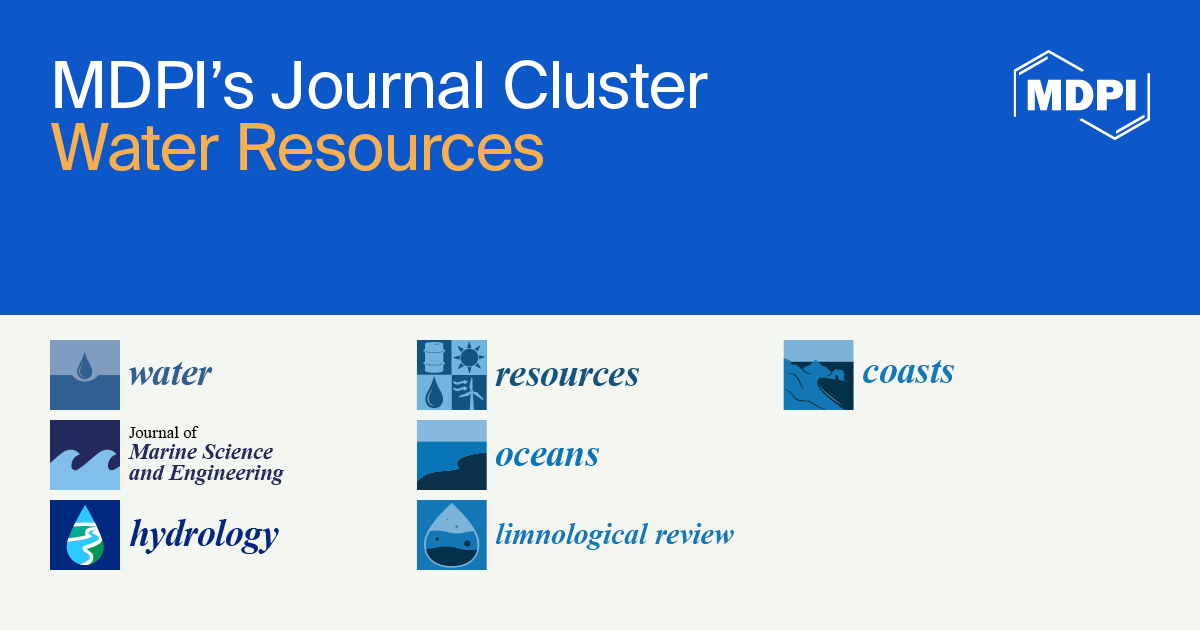
MDPI’s Journal Cluster of Water Resources
Water is a critical component of life on earth. Its vital role in areas including climate, bodily function, and energy generation makes water one of the most important resources on the planet. Water research encompasses a wide variety of scientific disciplines. Hydrologists study the distribution, availability, usage and movement of ground water, while oceanographers study tides, currents, and the composition of oceans. Water purification and water resource management are also pertinent topics for water-scarce regions in the world.
MDPI’s cluster of water resource journals is dedicated to the rapid dissemination of contemporary research on water and other related resources. MDPI’s oldest journal in this cluster, Water (IF 3.0), has published over 20,000 papers since 2009, conveying the latest research on water to its broad, multidisciplinary readership. This cluster also offers more specialized outlets for researchers focused on hydrology, marine science, oceanography, and coastal research, enabling their work to reach a more targeted audience.
The seven participating journals are as follows:
- Water (ISSN: 2073-4441) covers all aspects of water, including the ecology and management of water resources. Water is led by its Editor-in-Chief, Dr. Jean-Luc PROBST (University of Toulouse, France);
- Journal of Marine Science and Engineering (JMSE, ISSN: 2077-1312) focuses on research in the fields of ocean engineering, coastal engineering, physical oceanography, geological oceanography, marine biology, and marine environmental science. JMSE is led by its Editor-in-Chief, Prof. Charitha Pattiaratchi (Oceans Graduate School and the UWA Oceans Institute, the University of Western Australia, Australia);
- Hydrology (ISSN: 2306-5338) encompasses all aspects of hydrology, including groundwater, surface water, soil water, and atmospheric water, as well as snow and ice. Papers advancing the quantitative, qualitative, and ecological aspects of hydrology together with water management are welcome. Hydrology is led by its Editor-in-Chief, Prof. Dr. Ezio Todini (Italian Hydrological Society, Italy);
- Resources (ISSN: 2079-9276) focuses on natural resources; mineral and geo-resources; land and ecological resources; plant and animal resources; water resources; energy resources; food and bio-resources; resource conservation, reuse, and recycling; sustainable resource management; resource stewardship, governance, and policy; circular economy and new business models; modeling resource flows and impacts. Resources is led by its Editor-in-Chief, Prof. Dr. Benjamin McLellan (Graduate School of Energy Science, Kyoto University, Japan);
- Oceans (ISSN: 2673-1924) is specifically addressed to studies related to all branches of oceanography with an emphasis on the functioning of the ocean and the sustainable use of its resources and ecosystem services. It publishes original research papers, critical reviews, short communications, and commentary. There is no restriction on the length of its papers. Oceans is led by its Editor-in-Chief, Prof. Dr. Beatriz Morales-Nin (Mediterranean Institute of Advanced Studies CSIC-UIB, Palma de Mallorca, Spain);
- Limnological Review (ISSN: 2300-7575) covers all different subdisciplines of freshwater environment studies. Our aim is to provide a platform for publication, information, and debate, encompassing all areas which fall within the scope of freshwater science. Limnological Review is led by its Editor-in-Chief, Dr. Piotr Rzymski (Poznań University of Medical Sciences, Poland);
- Coasts (ISSN: 2673-964X) focuses on coastal engineering, management, conservation, biology, and ecology. Coasts is led by its Editor-in-Chief, Prof. Dr. Francisco Taveira Pinto (Civil Engineering and Georesources Department, University of Porto, Portugal and CIIMAR—Interdisciplinary Centre of Marine and Environmental Research, Marine Energy and Hydraulic Structures, Portugal).
MDPI’s Mission and Values:
As a pioneer of academic open access publishing, MDPI has been serving the scientific community since 1996. Our aim is to foster scientific exchange in all forms, across all disciplines. MDPI’s guidelines for disseminating open science are based on the following values and guiding principles:
- Open Access—All of our content is published in open access and distributed under a Creative Commons License, providing free access to science and the latest research, allowing articles to be freely shared and content to be re-used with proper attribution;
- Timeliness and Efficiency—Publishing the latest research through thorough editorial work, ensuring a first decision is provided to authors in under 32 days and papers are published within 7–10 days upon acceptance;
- Simplicity—Offering user-friendly tools and services in one place to enhance the efficiency of our editorial process;
- High Quality Service—Supporting scholars and their work by providing a range of options such as journal publication at mdpi.com, early publication at preprints.org, and conferences on sciforum.net to make a positive impact on research;
- Flexibility—Adapting and developing new tools and services to meet the changing needs of the research community, driven by feedback from authors, editors, and readers;
- Rooted in Sustainability—Ensuring the long-term preservation of published papers and supporting the future of science through partnerships, sponsorships, and awards.
By adhering to these values and principles, MDPI remains committed to advancing scientific knowledge and promoting open science practices.
Selected Topics and Special Issues:
- “Application of Smart Technologies in Water Resources Management, 2nd Edition”;
- “Advanced Approaches in Sustainable Water Resources Cycle Management”;
- “Research on Water Supply Systems and on the Treatment and Recovery of Wastewater and Stormwater”.
Selected Articles:
Water
“Trees in Sponge Cities—A Systematic Review of Trees as a Component of Blue-Green Infrastructure, Vegetation Engineering Principles, and Stormwater Management”
Journal of Marine Science and Engineering
“Modes of Operation and Forcing in Oil Spill Modeling: State-of-Art, Deficiencies and Challenges”
Hydrology
“A Machine Learning Approach to Map the Vulnerability of Groundwater Resources to Agricultural Contamination”
Resources
“Synthesis Methods, Properties, and Modifications of Biochar-Based Materials for Wastewater Treatment: A Review”
Oceans
“The Abundance of Microplastics in the World’s Oceans: A Systematic Review”
Limnological Review
“The Possible Use of Stable Carbon and Nitrogen Isotope Signal and Spectral Analysis to Identify Habitat Condition of Aquatic Plants”
Coasts
“Spatial and Temporal Changes in the Fish Fauna of a Low-Inflow Estuary following a Mass Mortality Event and Natural and Artificial Bar Breaches”







